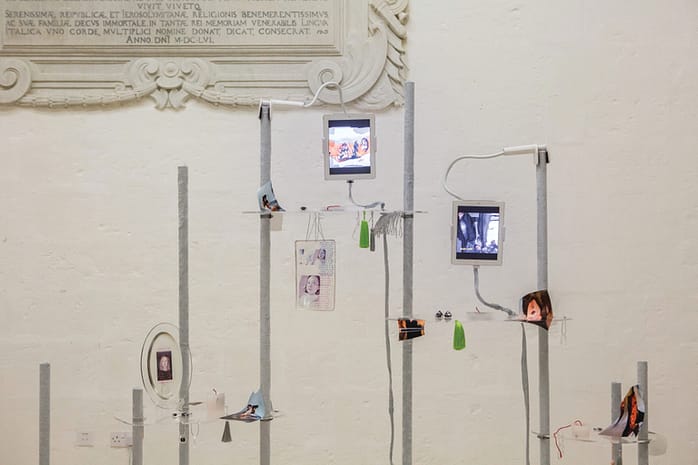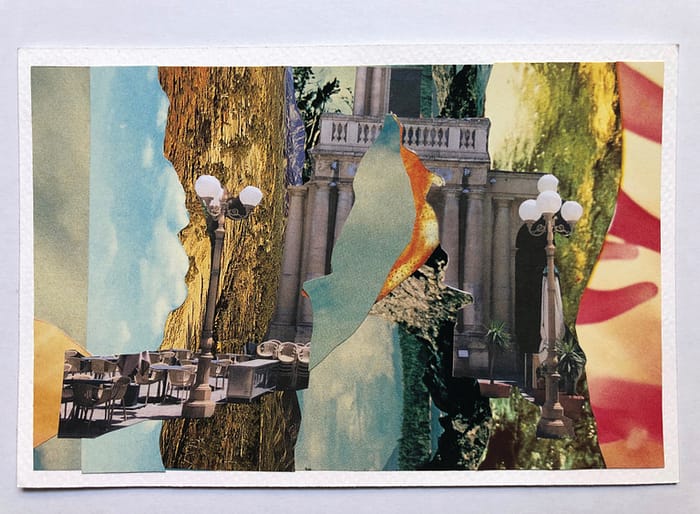Isle of a 1,000 Colonies
Debatable Land(s) is a year-long project presenting a reflection on the sporadic, and sometimes oblique nature of human action and global events, and on the power of historic narratives and common recollection. As she works on the project with colleagues – Greta Muscat Azzopardi, Maren Richter and Klaus Schafler – Margerita Pulè reflects on some of the project’s open-ended research topics. In particular, the diverse forms of coloniality in Malta and the artists who seek to challenge them.

As the world grapples with a pandemic that has thrown a stark light on entrenched inequalities alongside a backdrop of conspiracy theories and tipping-point elections, artists continue to contribute to debates on colonial histories and power dynamics. Here in Malta too, we have been faced with our own (not so) hidden flaws and paradoxes. Malta, the country that arguably invited the coloniser in, and watched while it stayed for tea, is now struggling to extricate itself from a Stockholm-syndrome of its own making.
The Black Lives Matter movement spread across the world, and we went through our own soul-searching moments; for a few short moments at least, the possibility of tumbling the formidable Queen Victoria from Republic Square entered the public consciousness. Coloniality, a perversely benign phenomenon in Malta, dragged us into its slipstream; we now found ourselves unsure if the presentation of an apparently unexceptional Maltese fossil to an heir to the English throne should cause indignation or not.
Local art institutions are ill-equipped to address this fall-out, being too close to the hand that feeds them, and are reluctant to dismantle their master’s house. Thus, artists must pick up their own tools and try to make sense of events, past, present and future. The (physically) small work Is it easier to get an honest reply from her or win the lottery? (2020) by Keit Bonnici riffed on this debate, sending a carefully made postcard to Queen Victoria’s descendant, the current Queen Elizabeth II, to ask her personal opinion – how did she feel about the debate surrounding the statue of her great-great-great- grandmother?
The word coloniality can of course be endowed with a broader meaning, away from the industries and pastimes of empires. Anibal Quijano’s ‘coloniality of power’ describes the structures of dominance, oppression, and hegemony in modern times. Keit Bonnici has form in challenging authority – in a ballsy art-gesture in 2019, he jauntily wheeled a purpose-made stool up Merchant Street, propped it up against the controversially-appropriated area in front of the Valletta Market, opened a thermos flask, and chatted with bemused customers while drinking his coffee.


This work was powerful in its simplicity, perhaps because the most apparent form of displacement of power comes with that of land, privatisation of already scarce public space, and abuse of planning laws are manifestations of this. Kristina Borg, who works with the relationships between the personal and the public, created a richly layered and sensitive work with curator Maren Richter in the project No Man’s Land in 2018. The work took a dialogical form, with the artist holding conversations with residents of the Grand Harbour area, but also inviting small audiences on a number of boat trips looking inwards from the sea onto ambiguous areas along the harbours’ shorelines, to observe how these have been appropriated by commercial, industrial and defensive interests.
Questioning the use of public space can also take the form of longer-term projects. Anyone who attended one of Fragmenta Malta’s events between 2013 and 2018 will appreciate its gentle take-overs of unloved or remote spaces, symbolically freeing in turn an abandoned hotel, a wasteland, a heritage sight, a beach through installations and site-specific works by numerous artists.
Recently commissioned official public artworks have been less successful, both in curation, conception and implementation. Pjazza Kastilja, for example, has been left bereft of its former dignity, and is not home to a hodgepodge of unlikely monumental bedfellows. Meanwhile, a more elegant ode to the Maltese Republic by Austin Camilleri, which was selected following a public call, and destined for a site in the lower part of Valletta, remained unrealised.
Working alongside institutions, Gozitan artist Victor Agius contested another version of self-colonisation with his installation Ħaġarna (2019). His practice brings him close to his native soil – literally – as he uses local clay, stone and other natural elements as his raw materials. Ħaġarna – in the form of a giant boulder cloven in two – is meant to be walked through in a re-experiencing and re-appropriation of our own land.

Re-seeing history as something that belongs to us, rather than to those in command can also serve to distance a society from its colonised mentality. The organisation Magna Żmien challenges hegemonic histories of Malta by giving importance to ‘everyday’ people, and their family chronicles. Making analogue home-recording and photos accessible to their owners and to the public can be seen as a radical act of decolonising in itself.
There are, of course, other forms of coloniality that we are barely conscious of – too many for this article; if you’re looking for it, coloniality exists in all sorts of places. Letta Shtohryn’s “woman”, “holding” (2020) is a feminist work; at its heart it uncovers our vulnerability in the face of algorithms that have inherited the biases of their programmers. Women’s bodies are no strangers to dominance; Charlene Galea’s prolific photographic practice gives women the power and autonomy to engage actively with their own portrayal, freeing them from the coloniality of social media and public approval.

Power linked with sex has a part to play too. Charlie Cauchi’s Scheherazade (2019) was built around a world where violence and coercion are inextricably linked with sex and entertainment – money and history bearing down, quite literally, on women’s bodies.
I could go on. However, there is a lacuna in all this which is worth mentioning; very few artists address issues of race and racism in Malta and even fewer go beyond focusing on the acceptance of recently-arrived migrants. This, perhaps, will change in a generation or two, as Malta’s population itself becomes more diverse, and blackness ceases to be equated with foreignness or recent migration.
For now, if we interpret all forms of coercion or inequality as forms of coloniality, decolonising our surroundings and behaviours will take a fundamental shift in our thinking. Perhaps artists can help us do this, not only symbolically and aesthetically, but also on in long-term practical and political terms.
Debatable Land(s) is an experimental spatial installation, and the first chapter of a year-long project dealing with mechanisms of space appropriation and their historical and current deviations, employing Malta as an artistic case-study. The first iteration of the project is presented in Kunsthalle Exnergasse, Vienna, from 29 October – 27 November 2020. Participating artists are Mohamed Ali ‘Dali’ Agrebi, Keit Bonnici, Antoine Cassar, Charlie Cauchi, Charlene Galea, Roxman Gatt, Jimmy Grima, Bettina Hutschek, Magna Żmien, Letta Shtohryn, Guy Woueté, Chakib Zidi, and Tobias Zielony. Debatable Land(s) is a project by Grammar of Urgencies Collective in collaboration with Margerita Pulè/Unfinished Art Space and Greta Muscat-Azzopardi, and part of the Fleeting Territories series. The project is supported by Arts Council Malta. www.wuk.at.










